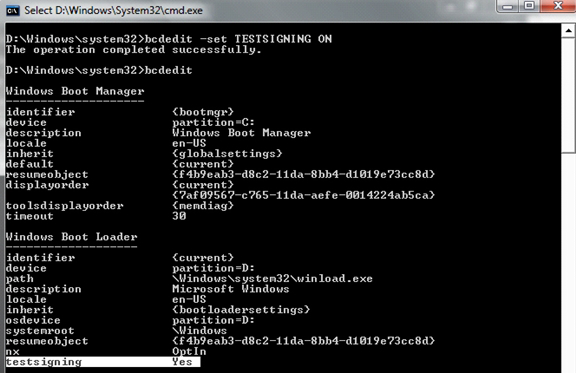Enable Loading of Test Signed Drivers
By default, Windows does not load test-signed kernel-mode drivers. To change this behavior and enable test-signed drivers to load, use the boot configuration data editor, BCDEdit.exe, to enable or disable TESTSIGNING, a boot configuration option. You must have Administrator rights to enable this option.
Note
Starting in Windows Vista, the kernel-mode code signing policy requires that all kernel-mode code have a digital signature to load on 64-bit versions of Windows. However, in most cases, an unsigned driver can be installed and loaded on 32-bit versions of Windows. For more information, see Driver Signing Policy.
Administrator rights required
To use BCDEdit, you must be a member of the Administrators group on the system and run the command from an elevated command prompt. To open an elevated Command Prompt window, type cmd into the search box in the Windows taskbar, select and hold (or right-click) Command Prompt in the search results, and then select Run as administrator.
Warning
Administrative rights are required to use BCDEdit to modify boot configuration data. Changing some boot entry options by using BCDEdit /set could render your computer inoperable. As an alternative, use System Configuration utility (MSConfig.exe) to change boot settings.
Enable or disable use of test-signed code
Run BCDEdit command lines to enable or disable the loading of test-signed code. For a change to take effect, whether enabling or disabling the option, you must restart the computer after changing the configuration.
To enable test-signed code, use the following BCDEdit command line:
:: If this command results in "The value is protected by Secure Boot policy and cannot be modified or deleted"
:: Then reboot the PC, go into BIOS settings, and disable Secure Boot. BitLocker may also affect your ability to modify this setting.
Bcdedit.exe -set TESTSIGNING ON
Note
Starting in Windows 10, version 1507, if you have Memory Integrity / HVCI (Hypervisor Code Integrity) enabled, you must test-sign the binary using any self-created test cert. An unsigned binary is not supported.
To disable use of test-signed code, use the following BCDEdit command line:
Bcdedit.exe -set TESTSIGNING OFF
The following figure shows the result of using the BCDEdit command line to enable test-signing.

Behavior of Windows when loading test-signed code is enabled
When loading test-signed code is enabled, Windows does the following:
Displays a watermark with the text "Test Mode" in the lower right corner of the desktop to remind users that the system has test-signing enabled.
The operating system loader and the kernel load drivers that are signed by any certificate. The certificate validation is not required to chain up to a trusted root certification authority. However, each driver image file must have a digital signature.